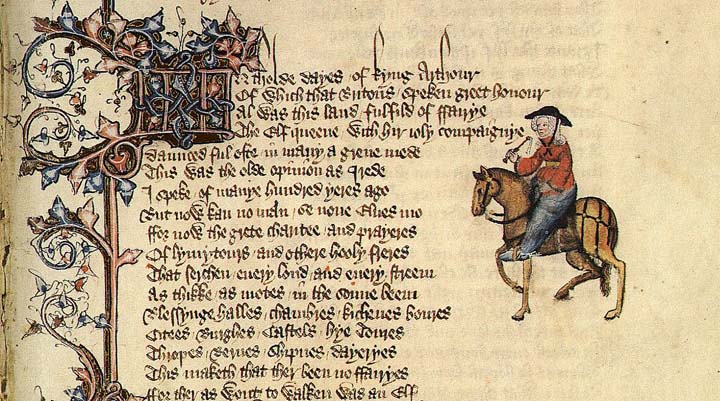The HP Series showcases excerpts from excellent Honours Projects by students from the Department of English Language and Literature. [Read all entries here.]

Supervisor: Professor Stuart Christie
An excerpt
63———Before I start, allow me to explain:
64—–I love to share, silent not to remain.
65—–Experience of love, I don’t have much,
66—–The previous I guess I tried to clutch.
67—–Expert of love I’m certainly not one,
68—–Just the narrator of what I have done.[1]
69—–Now, sir, now will I tell forth my story,[2]
70—–about a nice man I did not marry.
71———When my mom talked about virginity,
72—–“God loveth every wight,” she proudly told me,[3]
73—–“Virginitee is greet perfeccion,[4]
74—–But I adore youre imperfeccion.”
75—–Never did she mention chastity,[5]
76—–But to be who I truly want to be.
77—–As St Paul recommended all of us,
78—–A virgin or not, we need not to fuss.
79—–Choosing virginity over marriage,
80—–The debate has turned to another page
81—–Between St Jerome and Jovinian.[6]
82—–The reward in heaven for both women
83—–Does not depend on the weighting of blood,
84—–Nor frankness of vow, the counting of crud.[7]
85—–Though I was way too young to comprehend,
86—–I took it as treasure, tried to defend.
87—–As the Church always wanted us to bear,
88—–I kept it for all my years, neat and fair,
89—–Hoping my dearest would appreciate
90—–The effort I made to facilitate.
91———Sadly, when I look back, I have no clue,
92—–That day in the room that the curtains drew,
93—–That filled with warm glow, that was herb-scented,
94—–Was I taken or taken for granted?
95—–It happened so fast and so amorous.
96—–Was it love? Was it purely lecherous?
97—–In such a short time I could not decide
98—–This man who lay calmly at my bedside,
99—–who dared not look at my desolate eyes,
100—who carried love with the meaning of lies.
101—I thought that happened because of our love
102—Had grown seemingly strong and deep enough.
103—I thought that happened because of something
104—We shared, other than as the one last fling.
105—Although we met for years, he was all strange,
106—Love and sex do not just come in exchange.
107—Show me how virginity keeps a man,
108—When it has brought my marriage to an end.
109—I always guess we loved and felt the same,
110—just different people, different names.
111—Please do not get me wrong; I have no hate,
112—Not even an issue worthy of debate.
113—With my effort loved like a misery,
114—How do I have the strength for enmity?
115 ——After all these, there is one thing I learn,
116—That both lust and love have no return.
117—Both of them take only seconds to light,
118—But disappear as if a soaring kite.
119—There was the thing I refused to foresee,
120—But now, sorry, I cannot disagree:
121—Men only desire to have more pleasure,
122—Instead of having an intact treasure.
123—They want us for riches and our fairness,
124—for who can sing and dance, for our kindness,
125—for our shape, slender arms, and narrow waists,[8]
126—but none of the men wants us to be chaste.
127—I want it not, the highest affection,[9]
128—I want to love, with all my intention.
129—I am the glass vessel in the household,
130—Reflect gloriously and shin as gold,
131—Contain vibrant patterns and grain as wood,
132—Leave no scratches as any timber would.
133—Being opalescent, but not a vase,
134—Just something unique, one need not replace.
135—I love the glass as I love the leather,
136—The more you use it, it performs better.
137—Trusting one day I will be crystal clear,
138—And exquisite, drawing people to leer.
139 ——Reviewing all my dead relationships
140—That held back after kissing on the lips,
141—See, such perfection made none of them stayed,
142—But rather, some were tempted to betray.
143—Henceforth, I have started to realise
144—Falling in love is out of any wise.
[1] The Wife challenges the Church writings of the representation of women are “inadequate and biased” (Laskaya 178). The Daughter speaks honestly as a woman and by her own experience.
[2] The Wife lied to the audience that she “wol I telle forth my tale” (“WP” 193) since her tale begins in 600 lines later.
[3] The Wife argues that God never asks for virginity in any history: “Wher can ye seye, in any manere age, / That hye God defended marriage / By expres word? I pray yow, telleth me. / Or where comanded he virginitee?” (“WP” 59-62).
[4] The Wife holds a natural position while on the one hand agreeing virginity is great perfection (“WP” 105) and on the other hand she “envy no virginitee” (envye no virginitee) (“WP” 142).
[5] “Chaast” is mentioned twice and “Chastitee” is mentioned seven times in “WP” and “The Wife of Bath’s Tale” “WT.”
[6] On the issue of the controversy between St. Jerome, Jovinian, and the Wife over virginity, see Douglas Wurtele and Smith Warren.
[7] The idea of the equal status of virgin and married woman is proposed by Jovinian, who is described as “Jerome’s antagonist” (Wurtele 210). As the Wife mainly attacks St. Jerome in her prologue, the Daughter also considers St Jerome as the enemy and prefer supporting Jovinian.
[8] The Wife proposes that men desire women for “riches” (richesse), their shape (shap), fairness (fairnesse), the ability to sing of dance (outher synge or daunce), courtesy (gentillesse), small talk (daliaunce), their hands (hands) and slender arms (armes smale) (“WP” 257-261).
[9] Refers to the Christian ideal of feminine perfection as a virgin, being loved by the Church.
:::::
 Zarah Tong is a graduate of the Department of English and Department of Education (Class of 2018).
Zarah Tong is a graduate of the Department of English and Department of Education (Class of 2018).
